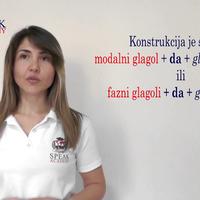Serbian Lesson 5.4 - Modal verbs - Serbian language courses
||Модальные|глаголы|||
Serbisch-Lektion 5.4 – Modalverben – Serbisch-Sprachkurse
Σερβικά Μάθημα 5.4 - Τροπικά ρήματα - Μαθήματα σερβικής γλώσσας
Serbian Lesson 5.4 - Modal verbs - Serbian language courses
Lección de serbio 5.4 - Verbos modales - Cursos de serbio
Leçon de serbe 5.4 - Verbes modaux - Cours de langue serbe
Сербский язык урок 5.4 - Модальные глаголы - Курсы сербского языка
Sırpça Dersi 5.4 - Modal fiiller - Sırpça dil kursları
MODALNI GLAGOLI
|verbs
Postoje glagoli u srpskom jeziku koji u prezentu traže dopunu u vidu još jednog glagola
|||||||||дополнение||виде|||
|||||||||||forme de|||
There are|||||||present tense|require|complement (1)||the form of|||
There are verbs in the Serbian language that require another verb in the present tense
Mogu da ti pomognem
|||help you
I can help you
Umorna sam, ali moam da završim ovo vežbanje
устала|||могу||завершить||упражнение
|||dois||||exercice
tired|||I can||finish||exercise (1)
I'm tired, but I have to finish this workout
Treba da požurimo da ne zakasnimo
||поторопимся|||опоздаем
||hurry|||be late
We should hurry so we won't be late
To su modalni ili fazni glagoli
||||фазные|
||||de phase|
||modal||phase|
These are modal or phase verbs
Modalni glagoli su glagoli koji označavaju neku potrebu ili želju da se radnja izvrši
|||||||потребность||желание|||действие|выполнена
|||||indiquent||besoin||désir|||action|accomplir
||||||||||||action|is performed
Modal verbs are verbs that indicate a need or desire to perform an action
ali to ne mora da znači da će se radnja zaista izvršiti
||||||||||действительно|выполниться
||||||||||vraiment|exécuter
but this does not necessarily mean that the action will actually be carried out
Fazni glagoli su oni glagoli koji označavaju neku fazu u vršenju radnje
||||||||||выполнении|
||||||indiquent|||||
||||||||||performing an|
Phase verbs are those verbs that indicate a phase in the performance of an action
Početak ili tok radnje
||ход|
Début||Déroulement|
||course|
The beginning or course of action
Počinjem da sumnjam u njegove namere
начинаю||сумневаюсь|||намерения
Je commence||Je doute|||
||doubt|||
I'm beginning to doubt his intentions
Nastavljam da trčim iako počinje kiša
продолжаю||бегать|||
Je continue||je cours|même si|commence|pluie
I continue||running|although|it starts|
I keep running even though it starts to rain
Konstrukcija je sledeća
||La suivante
The construction is as follows
modalni glagol + da + glagol u prezentu
modal verb + yes + present tense verb
ili fazni glagoli + da + glagol u prezentu
or phase verbs + yes + verb in the present tense
Istu konstrukciju imamo uz glagole hteti, voleti , želeti
|||||vouloir|aimer|désirer
|||with||||
We have the same construction with the verbs to want, to love, to want
Volim da šetam pored reke
|||рядом с|
||me promener|à côté de|rivière
|||by the|
I like to walk by the river
On želi da nauči da skija
|||научиться||кататься на лыжах
|||||ski
He wants to learn to ski
Da li oni hoće da pođu sa nama
|||||пойдут||
|||||partir||
|||||go||
Do they want to come with us?
Da ponovimo
|повторим
|Répétons cela.
|let's repeat
Let's repeat
konstrikciju da+prezent imamo uz modalne glagole
we have the constriction da+present with modal verbs
tj. glagole koji znače da se radnja nije izvršila ali za tim postoji volja, želja ili potreba ili pritisak da se izvrši
to||||||||выполнена|||||воля|желание||необходимость||давление|||
||||||action||effectuée||||existe||désir||besoin||pression|||effectuer
||||||||||||there is||||||pressure|||
i.e. verbs that mean that the action has not been performed but there is a will, desire or need or pressure to perform it
kao i sa glagolima koji označavaju početak ili trajanje radnje
|||глаголами|||||длительность|
|||||indiquent|||durée|action
as well as with verbs that indicate the beginning or duration of an action
Glagol trebati u ovoj konstrukciji uvek je bezličan:
|||||||impersonnel
The verb to need in this construction is always impersonal:
Uvek govorimo: Treba da
We always say: We should
ne trebam, trebaš već treba da
I don't need, you need, but you should
Iako ćete često čuti ili pročitati lični oblik ovog glagola po pravilima on je neličan
хотя||||||личный|форма||||правилам|||безличный
|allez|souvent|entendre||lire|personnel||||||||impersonnel
although||||||||||||||
Although you will often hear or read the personal form of this verb, according to the rules, it is impersonal
Treba da napišem to pismo
Ne: trebaš da napišeš to pismo

